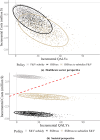The Health and Economic Impact of Using a Sugar Sweetened Beverage Tax to Fund Fruit and Vegetable Subsidies in New York City: A Modeling Study
- PMID: 36550343
- PMCID: PMC9918717
- DOI: 10.1007/s11524-022-00699-3
The Health and Economic Impact of Using a Sugar Sweetened Beverage Tax to Fund Fruit and Vegetable Subsidies in New York City: A Modeling Study
Abstract
Low fruit and vegetable (FV) intake and high sugar-sweetened beverage (SSB) consumption are independently associated with an increased risk of developing cardiovascular disease (CVD). Many people in New York City (NYC) have low FV intake and high SSB consumption, partly due to high cost of fresh FVs and low cost of and easy access to SSBs. A potential implementation of an SSB tax and an FV subsidy program could result in substantial public health and economic benefits. We used a validated microsimulation model for predicting CVD events to estimate the health impact and cost-effectiveness of SSB taxes, FV subsidies, and funding FV subsidies with an SSB tax in NYC. Population demographics and health profiles were estimated using data from the NYC Health and Nutrition Examination Survey. Policy effects and price elasticity were derived from recent meta-analyses. We found that funding FV subsidies with an SSB tax was projected to be the most cost-effective policy from the healthcare sector perspective. From the societal perspective, the most cost-effective policy was SSB taxes. All policy scenarios could prevent more CVD events and save more healthcare costs among men compared to women, and among Black vs. White adults. Public health practitioners and policymakers may want to consider adopting this combination of policy actions, while weighing feasibility considerations and other unintended consequences.
Keywords: Economic evaluation; Food policy; Policy modeling; Urban health.
© 2022. The New York Academy of Medicine.
Figures



Similar articles
-
Linking a sugar-sweetened beverage tax with fruit and vegetable subsidies: A simulation analysis of the impact on the poor.Am J Clin Nutr. 2022 Jan 11;115(1):244-255. doi: 10.1093/ajcn/nqab330. Am J Clin Nutr. 2022. PMID: 34610088 Free PMC article.
-
Projected health and economic impacts of sugar-sweetened beverage taxation in Germany: A cross-validation modelling study.PLoS Med. 2023 Nov 21;20(11):e1004311. doi: 10.1371/journal.pmed.1004311. eCollection 2023 Nov. PLoS Med. 2023. PMID: 37988392 Free PMC article.
-
Estimated reduction in obesity prevalence and costs of a 20% and 30% ad valorem excise tax to sugar-sweetened beverages in Brazil: A modeling study.PLoS Med. 2024 Jul 17;21(7):e1004399. doi: 10.1371/journal.pmed.1004399. eCollection 2024 Jul. PLoS Med. 2024. PMID: 39018346 Free PMC article.
-
Environmental interventions to reduce the consumption of sugar-sweetened beverages and their effects on health.Cochrane Database Syst Rev. 2019 Jun 12;6(6):CD012292. doi: 10.1002/14651858.CD012292.pub2. Cochrane Database Syst Rev. 2019. PMID: 31194900 Free PMC article.
-
Outcomes Following Taxation of Sugar-Sweetened Beverages: A Systematic Review and Meta-analysis.JAMA Netw Open. 2022 Jun 1;5(6):e2215276. doi: 10.1001/jamanetworkopen.2022.15276. JAMA Netw Open. 2022. PMID: 35648398 Free PMC article.
Cited by
-
Policy models for preventative interventions in cardiometabolic diseases: a systematic review.BMC Health Serv Res. 2025 May 2;25(1):635. doi: 10.1186/s12913-025-12781-y. BMC Health Serv Res. 2025. PMID: 40312363 Free PMC article.
-
American Heart Association EPI|Lifestyle Scientific Sessions: 2021 Meeting Highlights.J Am Heart Assoc. 2022 Mar;11(5):e024765. doi: 10.1161/JAHA.121.024765. Epub 2022 Feb 18. J Am Heart Assoc. 2022. PMID: 35179039 Free PMC article. No abstract available.
References
-
- Xi B, Huang Y, Reilly KH, et al. Sugar-sweetened beverages and risk of hypertension and CVD: a dose–response meta-analysis. Br J Nutr. 2015;113(05):709–717. - PubMed
Publication types
MeSH terms
Grants and funding
LinkOut - more resources
Full Text Sources

